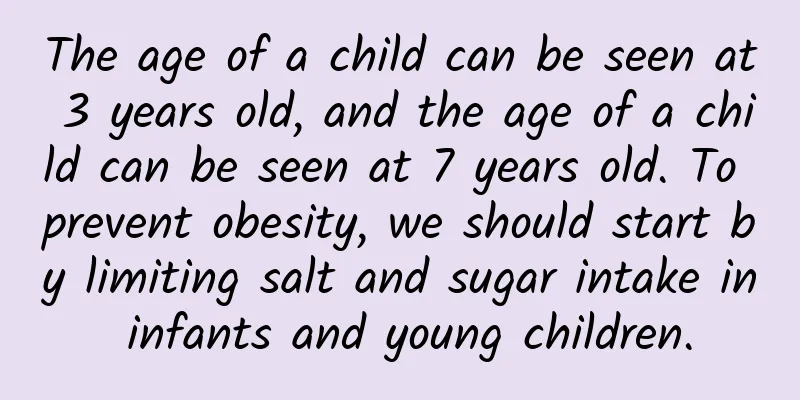The age of a child can be seen at 3 years old, and the age of a child can be seen at 7 years old. To prevent obesity, we should start by limiting salt and sugar intake in infants and young children.

|
This is the 3793th article of Da Yi Xiao Hu The key to controlling obesity and promoting health lies in prevention. March 4th of each year is "World Obesity Day" and May 11th is "World Obesity Day", both of which are designated by the World Health Organization as days for obesity education. Recently, there are many hot search topics about obesity, such as #World Obesity Day#, #More than half of adults in my country are overweight or obese#, #Obesity can lead to infertility#, #Childhood Obesity#, etc. Among them, the most important issue is childhood obesity. The age of 3 years old can tell the future, and the age of 7 years old can tell the old age. Prevention of obesity should start with salt and sugar restrictions for infants and young children. (Children are divided into three age groups: infants under 1 year old, toddlers 1-3 years old, and preschoolers 3-7 years old.) 1. Infancy is a critical period for developing eating habits Obesity is one of the most serious public health challenges in the 21st century, and childhood obesity is becoming more and more common. The "Report on the Nutrition and Chronic Disease Status of Chinese Residents" released by the State Council in 2020 shows that my country has become the country with the largest number of overweight or obese people in the world. What is more worrying is that nearly one-fifth of children are overweight or obese. Adult obesity only increases the volume of fat cells, while obesity in childhood increases the number and volume of fat cells. Therefore, most childhood obesity will last a lifetime, affecting children's lifelong health and happiness. The development of obesity is closely related to personal life and eating habits. Good eating habits and taste preferences should be scientifically cultivated from the birth of infants and young children. A salt-free and sugar-restricted diet starting from infants and young children is a key measure to promote the health of infants and young children and prevent obesity. Infants and young children have very sensitive taste buds, and the natural taste of food is very delicious. Eating natural food without salt and sugar is the best choice. If infants and young children are given heavy-tasting condiments such as salt and sugar too early, it will affect the healthy development of taste and develop an unhealthy diet with a high salt and sugar intake. Infancy is the fastest growth and development period, and the organs of the body are also maturing. The diet is mainly composed of protein-rich milk. Six months after birth, complementary foods should be added gradually, initially adding iron-fortified rice noodles, vegetable puree, fruit puree, minced meat, vegetable puree, eggs, fish puree, tofu, formula rice noodles, fruits and other complementary foods. Avoid adding salt to the diet within 1 year old, avoid adding sugar to the diet within 5 years old, and limit the intake of sugary drinks. Developing a light diet habit from infancy can prevent obesity and is the foundation of a lifetime of health and happiness. Salt and sugar are two important elements for the human body. Historically, they have been officially monopolized because of their scarcity. However, with the advancement of science and technology and the development of production, they have become basic food ingredients and are no longer scarce. On the contrary, due to excessive intake, these two ingredients are increasingly endangering the health of infants and children and even the entire human race. Less salt and less sugar have become the most important tips for healthy eating! 2. Reasons for prohibiting infants under 1 year old from eating salt The main components of edible salt are sodium ions and chloride ions. The sodium ions and chloride ions contained in breast milk, milk powder, rice flour, vegetable puree, fruit puree, minced meat, chopped vegetables and other complementary foods consumed by infants and young children can meet their physiological needs, and there is no need for additional salt supplementation. The reason why infants under 1 year old are prohibited from consuming salt is not only to cultivate a habit of eating light food from infancy, but also because the kidney function of infants is immature! Sodium chloride, the main component of salt, is metabolized in the kidneys. Eating salt when the kidney function is underdeveloped or immature can increase the burden on the kidneys, affect kidney function, and may even lead to renal insufficiency. The glomerular filtration function and tubular reabsorption function in the kidneys of infants and young children are immature, and only reach 90% of the adult level at the age of 1. Therefore, infants and young children under 1 year old cannot eat salt. Salt is difficult to excrete in infants and young children under 1 year old, which may cause water and electrolyte imbalance in the body, affect the metabolic function of tissue cells and cause edema, and then cause high blood pressure, which increases the burden on the kidneys and heart. 3. Reasons to avoid adding sugar to the diet of children under 5 years old Children grow and develop rapidly, and need a variety of rich nutrients to meet their needs. Balanced and reasonable nutrition is a prerequisite for ensuring the healthy growth of children. At the same time, it is also a critical period for developing good living and eating habits. For children, from infant milk feeding to the addition of complementary foods and staple foods, the principles to be followed are natural, additive-free, and rich and balanced nutrition. Breast milk, milk powder, rice flour, vegetable puree, fruit puree, minced meat, minced vegetables and other foods consumed by infants and young children can provide enough energy for growth and development, and there is no need to add sugar. Children under 5 years old should not only avoid adding sugar to food, but also avoid drinking sugary drinks. Clinical studies have confirmed that fructose and sucrose in sugary drinks such as soda, sports drinks, fruit juice drinks, and lemonade can significantly increase the body's ability to synthesize fat in the liver. Therefore, these sugary sweetened drinks that everyone likes to drink are not good for children's health, and may increase the risk of obesity, tooth decay, heart disease, diabetes, fatty liver and other diseases. In their daily diet, if children get 10% of their calories from sugar, they may have abnormal cholesterol levels, including elevated low-density lipoprotein cholesterol, elevated triglycerides, and low high-density lipoprotein cholesterol, which in turn increases the risk of cardiovascular disease and type 2 diabetes. In addition, these sugary sweet drinks that everyone likes to drink are addictive, which can affect children's eating habits and taste preferences, causing them to have a heavy taste for sugar. Therefore, children under 5 years old should avoid adding sugar to their diet and drinking sugary sweetened beverages. They can drink pure water and plain milk. Adhere to good light sugar-free diet and lifestyle habits, and continue to popularize the benefits of doing so. Most children will continue to maintain such healthy habits when they grow up and reach adulthood. You can tell a lot about a person’s future at the age of 3 and about his old age at the age of 7. To prevent obesity and promote health, we need to start by limiting salt and sugar intake among infants and young children! Author: Xu Lingmin, Chief Physician, Department of Pediatrics, Qingpu Branch, Zhongshan Hospital Affiliated to Fudan University |
>>: Ding~ Please check out a guide to children’s orthodontics!
Recommend
Women with these factors may be "targeted" by ovarian cancer! Learn these tips to prevent it
Ovarian cancer, breast cancer and uterine cancer ...
What causes pregnant women to have bad breath?
There are many people with bad breath in life, an...
Breast hyperplasia feels like a lump
Women often experience noticeable pain in their b...
What causes lower abdominal distension and pain during pregnancy?
Once a woman becomes pregnant, she will experienc...
How to distinguish lochia from menstruation
Lochia is the discharge from the vagina after a w...
Girls' underwear always smells like urine
For girls, due to their physiological characteris...
Successful pregnancy after one month of miscarriage
Many young female friends get pregnant unexpected...
Can women drink Wubao tea?
Many people have seen some promotional advertisem...
Can the unknown pneumonia in Wuhan be spread through express delivery? How can the unknown pneumonia in Wuhan be spread?
We all know that there have been many cases of un...
What to do if you haven't had your period for a year
If you haven't had your period for a year, yo...
What medicine should I take to regulate my delayed menstruation?
The onset of menarche in women means that they ha...
How to reuse old dishes and chopsticks? What are the uses of old dishes and chopsticks?
We all know that bowls and chopsticks are a commo...
Pessary Clinical Application Guide
The Manual for the Clinical Application of Pessar...
Female urine occult blood 30% normal
First of all, if occult blood is found during a p...









